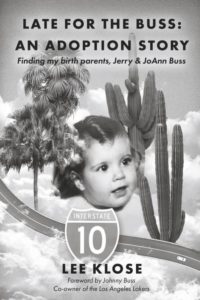What We're Reading
LEE KLOSE, M.A., M.Ed, has kept a journal most of her life. After a successful corporate sales career in consumer products, she started her own rep firm in 2000. At the age of sixty-four, she began writing her memoir after finding her birth family. Late For The Buss: An Adoption Story is the result of years of fruitless searching only to discover that she is the eldest biological daughter of Dr. Gerald Buss, the multi-millionaire, legendary owner of the Los Angeles Lakers and his wife, JoAnn.

After reading Late For The Buss: An Adoption Story, I just had to talk with Lee, and she was gracious enough to sit down for a very thoughtful discussion. Her story is so similar, so relatable while also being quite unique. I’m always interested in the creative process and how those with difficult stories to tell find the courage to share. Here’s a bit of our conversation.
LISA: I know you’ve been journaling for most of your life. When did you decide that your journals should become a book?
LEE: I really started getting serious about this being more than just journal entries in 2017, and I began calling it my adoption journal. I joined Ancestry in 2018, and that’s when I got serious about finding my birth parents. Then I got to meet my first relative, my Aunt Susan, and I learned my birth name, and by that time, I was journaling every day and sometimes through the night and that’s when I said this is going to be a memoir.
LISA: So did the process change at that point?
LEE: Once I knew that the journal was now a memoir and the memoir was going to be a book, I started pulling out all of the facts and figures and the memories started flooding. Fortunately, I was the keeper of the papers and pictures of my adoptive family, so I just sat on the floor and went through everything. I just swam in it for a long time.
LISA: In the book, you use an interesting technique of interspersing events of your birth father’s life, a public figure, with events from your life at the same time. The juxtaposition of contemporaneous events is very effective. Why did you decide to do that?
LEE: I wanted to explore the idea that one decision can change everything. In the book, you see a picture of me and my adoptive sister at The Chinese Theater, not knowing, of course, that someday my birth father would have a star there. Then, I had a lot of work in New York, and I went past the Chrysler Building constantly not knowing that my father used that building to buy the Lakers. I think the most critical picture in the whole book is the one of my son when he was at basketball camp. He’s standing with Jamaal Wilkes who of course doesn’t know that this is the grandson of his boss, Dr. Buss. That blows me away.
LISA: There’s so much to draw from. How did you decide what to leave in and what to take out?
LEE: The goal was to write my adoption story. Along the way, people have asked why I didn’t talk more about this or that. And I would say because it’s not central to the story. I wanted the reader to walk the path with me as a child, as a teenager and as an adult and feel what I felt and understand the decisions that I made based on the fact that I always struggled with who I was.
LISA: Writing about something this profound requires a real willingness to go deep, and that can be difficult to sustain. Was there a time when you wanted to stop writing?
LEE: I think I lost my boundaries for a while. The who am I? question and the what is my place in this world? question came up, and I had to go through all of that. That was tough. In fact, it is a pivotal part of the book when I explain that I’ve lost my boundaries, and I’m wondering what would my life be like if I had grown up in that family. And my friend Peggy said, ‘you need to take that Buss box and put it away right now, walk away from it.’ She said, ‘you are Lee Klose, end of story.’ That was a change for me, and that’s when I started saying, I am writing this book but everything in this world today is as it should be.
LISA: What helped you to keep going?
LEE: I was lucky to have a wonderful therapist, one of the best in the country, Dr. Carl Hammerschlag, and after my Dad died, he would always ask me, ‘are you journaling? Are you writing this down?’ And I was. Then when I found my birth family 25 years later, Dr. Hammerschlag was still able to see me, even though he was quite old at this point, and again he kept saying, ‘are you writing? You’ve got to get all of this down.’
LISA: And the story is continually unfolding as you’re writing. You didn’t know how the story would end.
LEE: When you’re finding your birth family, there’s a lot of waiting, as you know. Once I joined Ancestry, my Aunt Susan popped up right away, and I wrote to her. In my letter, I told her where I was born and sent her my non-identifying information. Even so, it took her a long time to answer. She was very cautious but once we met, she said she knew it was me.
LISA: Two years on, how do you feel about the whole process? Are there any lessons learned that you can share with other aspiring memoirists?
LEE: I’m just very happy that the book is out there. What I would say is take your time and just allow it to be. It’s out there forever in print, so I want to tell people don’t be in a hurry. Also, you have to know that when you write about something that is an event in your life, it’s how you see it. It may not be how the others see it. All non-fiction writing has consequences, and I did take the time to consider everyone’s feelings.
LISA: In the introduction to the book, you say: Writing this book has been an experience like none other in my life. It has been a healing journey and a harrowing one all at the same time. So how did writing this memoir help you to heal?
LEE: Well, forgiveness is certainly another theme in the book. Forgiveness is so important If you want to have continuing relationships. Forgiveness is what allows everyone to move on.
